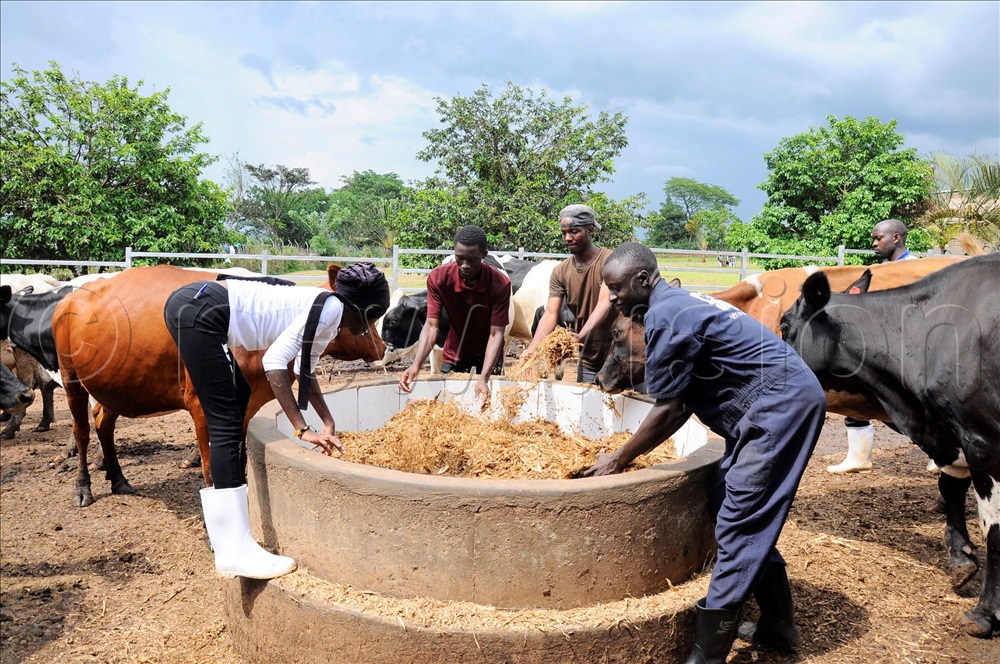Twaha Kakooza, the owner of Shatwa mixed farm in Kayunga district vividly recalls the heavy losses he suffered due to inadequate biosafety measures on his farm a few years ago.
His farm experienced devastating epidemics that led to the massive death of cattle and chickens.
“Livestock, including cattle, goats, sheep, and chickens, are prone to contagious diseases. Farmers should never compromise on vigilance and preventive measures,” he says.
Peter Mubiru, a veterinary officer defines biosafety as the elimination of all risks associated with importing or spreading animal diseases between farms.
“Biosafety is something every livestock farmer must take seriously, even if their farm appears safe from epidemics,” he explains.
“Simple precautions, such as erecting a boundary fence to keep out wandering animals from neighbouring farms and avoiding the purchase of animals with visible signs of illness, can help minimise disease outbreaks.”
Impact of lax biosafety measures
Mubiru warns that failure to enforce biosafety measures has dire consequences.
“To maximise profits, farmers should focus on disease prevention rather than dealing with costly treatments,” he advises.
He says biosafety measures ensure that infected animals and contaminated feeds do not spread pathogens to other animals or neighbouring farms.
Kakooza highlights that farmers who sell livestock products, such as milk, beef, hides, eggs, and chicken, must prioritize biosafety to protect both local and regional markets.
For instance, he explains that an outbreak of Foot and Mouth Disease (FMD) can wipe out the entire market for livestock products overnight, affecting both small-scale and commercial farmers.
Preventing such outbreaks through strict biosafety regulations is the best way to safeguard farm businesses.
According to Kakooza, biosafety aids in the early detection of deadly diseases, reducing their impact. Farmers can contain outbreaks within a small group of animals rather than allowing them to spread across the farm and to neighbouring areas.
“If an outbreak is not controlled, prices for livestock and related products can drop drastically, taking months or even years to recover,” Kakooza explains.
Beyond individual farms, biosafety plays a crucial role in preventing the spread of pests and diseases across regions and national borders.

Internal biosafety measures protect districts and regions, while external measures ensure Uganda’s border posts and airports remain disease-free.
How livestock farmers can ensure biosafety
Fencing
Kakooza advises that farms should have double fencing and restricted pathways to prevent disease transmission. Wild animals can carry diseases such as Foot and Mouth, posing significant risks to livestock.
“The best disease prevention strategy is to operate a closed farm with firm boundary fences. The cost of constructing a fence is far less than the financial losses incurred due to disease outbreaks,” he stresses.
He says domestic animals, such as dogs and cats, should also be confined within the farm. Allowing them to roam freely exposes them to potential disease carriers.
“Manure should be properly treated, and grazing areas should be well maintained to reduce the risk of parasite infestations,” he explains adding that farmers should avoid bringing animals or animal products from outside sources without thorough screening.
Limiting unnecessary traffic
People can unknowingly transmit diseases to farms. Farmers should restrict visitor access and prohibit unauthorized contact with livestock.
Kakooza recommends that visitors to model farms should be screened to ensure they have not recently visited farms with disease outbreaks. Keeping a record of all visitors and deliveries enables follow-up investigations if an infection occurs.
“Access points should be limited, with designated entry and exit points for easy monitoring. A telephone number should be displayed at the entrance for appointment scheduling. Additionally, signs outlining biosafety measures should be posted at farm entrances.”
He adds, “drivers of essential vehicles, such as feed and milk trucks, should be restricted to specific areas to minimize contamination risks.”
Disinfection protocols
Ruta Ngambwa, the director Prime Agro Uganda Limited and expert in dairy farming, says all individuals entering the farm should disinfect their boots in a footbath. Footbaths should be placed at every barn entrance, and disinfectant solutions must be changed regularly.
He says farmworkers should wear different clothing and footwear in each barn to prevent cross-contamination. Water from local sources should be tested annually to ensure it is not contaminated. Farmers should also assess their suppliers to avoid cross-contamination.
“All trucks entering the farm must be disinfected. Animal handling facilities and equipment should also be cleaned and disinfected frequently. Visitors should be provided with disposable overalls, boots, or shoe covers”, he advises.
Ngambwa explains that veterinary professionals and inspectors must wear protective garments and disinfect their boots before entering and exiting animal enclosures. Family members and employees who visit other livestock facilities should change their clothes and wash their hands before handling farm animals.
Separating animals
Ngambwa says sick animals should be isolated immediately to prevent the spread of infections. Farmers should have designated areas for sick animals, maternity barns, and separate spaces for young and old livestock.
“Barns must be cleaned and disinfected regularly. If an outbreak occurs, affected animals should be quarantined, and a veterinarian should be contacted promptly,” he advises.
Managing feeds and equipment
Mubiru says farmers must be cautious about where they purchase feeds and equipment, ensuring they come from reputable dealers. Proper pest control measures should be in place to keep insects, rodents, and birds away from feed storage areas, as they can carry and spread diseases.
Livestock should not be exposed to raw household waste, and any food waste used as animal feed should be fully cooked before being fed to pigs and other animals, he states.
“When purchasing new livestock, farmers must demand health guarantees from the seller, including blood test results. Newly acquired animals should be quarantined for at least two weeks for observation.”
In cases of disease outbreaks, Mubiru says farmers should contact their veterinarian immediately if they notice unusual symptoms in their livestock.





